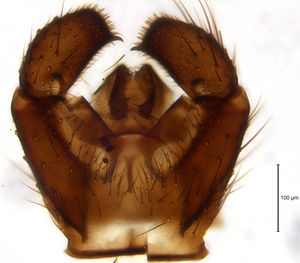Trichosiopsis norvegica
Ordo: Diptera
Familia: Sciaridae
Genus: Trichosiopsis
Name
Trichosiopsis norvegica unpublished
Type material
Holotype: ♂, 02.06.2014, Sweep netting, leg. Olsen, bf-sci-00350 in NHMO
Type locality
Norway, Vestfold, Larvik, Jordstøyp N
Barcoded material
| Stadium | Country | Province | Locality | Habitat | Method | Date | Collector | Collection Number | Collection | Latitude | Longitude | Elevation (m) |
|---|---|---|---|---|---|---|---|---|---|---|---|---|
| 1 ♂ (holotype) | Norway | Vestfold | Larvik, Jordstøyp N | blandingsskog | Sweep netting | 02.06.2014 | Kjell-Magne Olsen; Øivind Gammelmo | bf-sci-00350 | NHMO | 59.194 | 9.937 | 105 |
| 1 ♂ | Norway | Sogn og Fjordane | Luster, Klypenosi | Sweep netting | 05.06.2014 | Kai Heller | bf-sci-00122 | NHMO | 61.5 | 7.76 | 714 | |
| 1 ♂ | Norway | Vestfold | Larvik, Jordstoyp N | Sweep netting | 02.06.2014 | Kai Heller | bf-sci-00171 | NHMO | 59.194 | 9.937 | 105 | |
| 1 ♀ | Norway | Oppland | Soer-Aurdal, Moldberget E | barskog | Sweep netting | 03.06.2014 | Øivind Gammelmo; Kjell-Magne Olsen | bf-sci-00422 | NHMO | 60.62 | 9.893 | 308 |
| 1 ♀ | Norway | Buskerud | Ringerike, Veksalbekken | ravine | Sweep netting | 03.06.2014 | Øivind Gammelmo; Kjell-Magne Olsen | bf-sci-00472 | NHMO | 60.175 | 10.2 | 110 |
| 1 ♂ | Norway | Telemark | Tinn, Øvre Gunleiksrud Eng E garden | Noe baserik soervendt bakke med natureng, slætt og beitet. | Malaise trap | 25.5.–16.6.2014 | S. Reiso | bf-sci-01160 | NHMO | 60.137 | 8.65 | 810 |
| 1 ♂ | Norway | Telemark | Tinn, Øvre Gunleiksrud Eng E garden | Noe baserik soervendt bakke med natureng, slætt og beitet. | Malaise trap | 25.5.–16.6.2014 | S. Reiso | bf-sci-01161 | NHMO | 60.137 | 8.65 | 810 |
| 1 ♀ | Norway | Sor-Trondelag | Trondheim, Sommerlystvegen 22 | Malaise trap | 1.6.–8.6.2014 | Elisabeth Stur; Torbjørn Ekrem | BIOUG15597-B10 | NTNU | 63.405 | 10.383 | 65 |
Description (male)
Head. Eye bridge 5–6 rows of facets. Antenna unicolour. LW-index of 4th flagellomere 1.9–2.1; neck 0.13–0.25 × segment width; transition of basal part to neck pronounced. Colour of neck unicolour. Antennal setae shorter than segment width; of normal strength; dense; salient. Palpus darkened; long; palpomeres 3. First palpomere elongate; with 3–4 setae; with only sparse sensilla. Second palpomere elongate. Third palpomere as long as first. Thorax. Colour brown. Notum unicolour. Thoracic setae long and strong; brown. Posterior pronotum bare. Mesothoracic sclerites bare. Legs. Colour yellow. Hind coxa of same colour as femora. Setae on front coxa darkened. Front tibial organ as patch of setae; dark; front tibial organ not bordered. Tibial setae on hind legs normal, shorter than tibial width. Tibial spurs of equal length. Claws untoothed. Wing. Wing slightly darkened; of normal shape. Wing membrane without macrotrichia. Wing venation weak, with faint stM. M-fork of normal shape. R1 ending at or slightly before base of m-fork; posterior veins with macrotrichia; stM mostly with macrotrichia, or with a few macrotrichia; CuA1 and CuA2 mostly with macrotrichia; bM bare; r-m with few setae; bM:r-M 0.85–1.05; st-Cu:bM 0.35–0.5; R1:R 1.4–1.63; c:w 0.6–0.7. Halter darkened; of normal length. Abdomen. Abdominal setae strong; on tergites black; on sternites black. Hypopygium concolour with abdomen; LW-index 0.63–0.73. Base of gonocoxites with strong setae; gonocoxites broadly separated; inner margin of gonocoxites narrowly U-shaped; inner membrane of hypopygium densely setose; ventral margin of gonocoxite with short setae. Gonostylus elongate; LW-index 1.9–2.1; Inner margin straight; apex with one obtuse angle. Apical tooth present; without internal structure; of medium strength; LW-Index 1.8–2.8. Awl-like setae normal; present beneath apical tooth. Megasetae absent. Whiplash-hair absent. Tegmen 0.3–0.5 × longer than broad; equally rounded; without special features; central process absent. Length of ejaculatory apodeme/hypopygium 16–26 %; base of ejaculatory apodeme present. Field with aedeagal teeth inconspicuous. Measurements. Body size 3–3.7 mm. Hind tibia 1.45–1.65 mm. Wing length 2.6–3.2 mm.
Diagnosis
Trichosiopsis norvegica is placed in the Tr. rejecta group because of the elongated setae at the base of the gonocoxites and the gonostylus having an apico-dorsal angle. The shape of the gonostylus is nearly rectangular and reminds of Trichosiopsis scutellata. However the hairs on the antennae are not so conspicuously long. It is most similar to its sister species Trichosiopsis subnorvegica and also Trichosiopsis natiae. For differences see under the latter.
DNA Barcoding
The COI sequence is assigned to BIN BOLD:ACP6643 (average distance 0.00%, max. 0.00%, n=8, K2P: 8.36%).
Etymology
The species was named after the country, where it was found.
Discussion
Tr. norvegica is widespread and common in Southern and Central Norway. The first record was a female, which was collected in a mass Malaise sampling in Trondheim and was found to be genetically unique. Later, barcoding of corresponding males made the species identifiable by morphology as well.
Distribution
Norway.
Images
|





